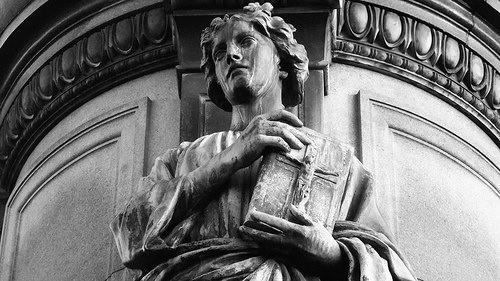We run our website the way we wished the whole internet worked: we provide high quality original content with no ads. We are funded solely by your direct support. Please consider supporting this project.

History and Bible: Do They Align?
To begin, it is significant that when Jesus and the authors of the NT referred to their sacred writings as “God-breathed,” they were referring to the writings that had been handed down to them. So too, the text that the Church has always confessed to be “God-breathed” has been the canon she received. Never has the “God-breathed” nature of the text been affixed to oral or written versions of the biblical material that preceded the written text. For this and other reasons, I find that the “God-breathed” status and divine authority of Scripture attaches to its final canonical form. This alone is the text we are called to wrestle with, with the ultimate goal of discerning how any given passage bears witness to the faithful and merciful covenantal God who was definitively revealed in Christ.
This means, among other things, that our estimation of a passage’s “God-breathed” nature and/or its divine authority should not hinge upon anything like historical-critical considerations. While source and redaction criticism may at times shed light on the pre-history of a text that may be relevant to its exegesis, neither these nor any other branch of biblical criticism should ever be allowed to affect our estimation of the final form of a passage. The fact that a portion of Scripture may have had a different meaning before it assumed the form it has within the canon is largely irrelevant to the contemporary theological task of hearing God speak through the final form of Scripture.
Moreover, to affirm that the canonical form of a text is “God breathed” is to affirm that its authority as well as its interpretation for the Church is not contingent upon how it does or does not conform to so-called “objective history” (historisch) – viz. to any particular scholarly reconstruction of “what actually happened.”
I am persuaded that we are called to embrace the faith conviction that each passage is trustworthy for the divine purposes for which it was “breathed.” If one happens to be led by the available evidence to the conviction that a particular passage does not correspond to “what actually happened,” then, in my view, this simply indicates that corresponding to “objective history” must not have been part of the theological purpose that God intended for that passage.
We are failing to read biblical narratives as they were originally intended to be read when we read them through the grid of how they do or do not cohere with “objective history.” For in this case we are importing into our reading of the narrative modern concerns that are alien to the text, rather than allowing the text to communicate its concerns to us. To read Scripture faithfully, we must read it with the assumption that the meaning of the canonical passage is found in the text, not outside of it in the way it relates to (someone’s reconstructed version of) “objective history.”
To be sure, I grant that attempting to demonstrate a correlation between biblical accounts and “objective history” may sometimes be highly significant for apologetic purposes. Most importantly, I am convinced that the intellectual plausibility of the Christian faith hangs, to a significant degree, on our ability to demonstrate the general historical reliability of the Gospel portraits of Jesus, which I, along with Paul Eddy, argue for in The Jesus Legend. But as it concerns the call for Jesus-followers to hear and obey God’s voice through Scripture, it’s my conviction that all that matters is the narrative in its final canonical form.
I should add that, while I believe it is important for apologetic purposes to anchor the Gospel portraits of Jesus in verifiable history, I have become convinced that it is apologetically unwise, to say the least, to leverage the credibility of the Christian faith as a whole on the historical veracity of the biblical narrative as a whole. There is no reason the credibility of the faith should be leveraged on a conservative evaluation of historical evidence for every aspect of the biblical narrative, and, in any event, the conservative perspective is, in some instances, very hard to defend in light of the archeological evidence. The more important point for our present purposes, however, is that there is absolutely no reason to tether the traditional faith-affirmation that all canonical texts are “God-breathed” to a particular way of relating any or all of these texts to a scholarly reconstruction of actual history.
Image by byronv2 via Flickr.
Category: General
Tags: Bible, Bible Interpretation, Biblical Criticism, Historical Criticism
Topics: Biblical Interpretation
Related Reading

How the Bible is Trustworthy
All of God’s communication in the Scriptures are covenantal in nature. Expressing his covenantal love and faithfulness, God stoops to “breath” Scripture as a means of bearing witness to his covenant relationship with Israel, and then with the Church. Ultimately God “breathed” (2 Tim 3:16) the Scriptures in order to bear witness to the One…

Is There an Actual Satan?
Roger Olson wrote an excellent piece on how contemporary Christianity has tended to ignore or altogether extract Satan from the Biblical text. He explores some of the possible reasons for it and also discusses his own journey as he wrestled with the belief in the demonic realm. Really interesting. Here’s a personal experience of the…

Sermon Clip: Twisted Scripture – Job
The Book of Job has often been misused as a way to explain the mysterious ways of God in suffering and pain. The truth is that the Book of Job is there to teach us that God does not inflict pain and suffering, rather it is the cosmic warfare that we cannot see which interferes…

Crucifixion of the Warrior God Update
Well, I’m happy to announce that Crucifixion of the Warrior God is now available for pre-order on Amazon! Like many of you, I found that the clearer I got about the non-violent, self-sacrificial, enemy-embracing love of God revealed in Christ, the more disturbed I became over those portraits of God in the Old Testament that…

The Way We Disagree Matters
Rachel Held Evans posted her reflections on the ways we interact over differences in Biblical interpretation. It’s an important topic as we live out the kingdom among one another in our polarizing environment. How do you maintain a Christ-like posture when you are attacked or when others question your devotion to Christ when you express…

What Bible Translation Do You Recommend?
Greg talks about Bible translations. http://traffic.libsyn.com/askgregboyd/Episode_0051.mp3
